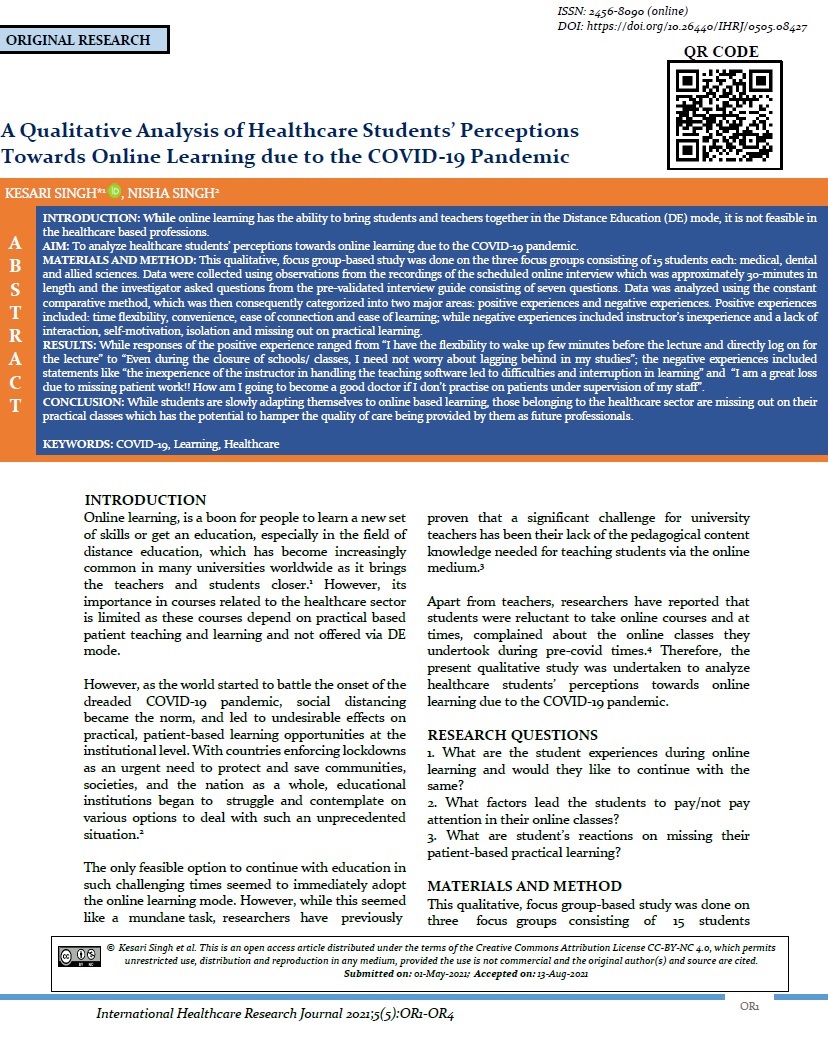A Qualitative Analysis of Healthcare Students’ Perceptions Towards Online Learning due to the COVID-19 Pandemic
Abstract
INTRODUCTION: While online learning has the ability to bring students and teachers together in the Distance Education (DE) mode, it is not feasible in the healthcare based professions. AIM: To analyze healthcare students’ perceptions towards online learning due to the COVID-19 pandemic. MATERIALS AND METHOD: This qualitative, focus group-based study was done on the three focus groups consisting of 15 students each: medical, dental and allied sciences. Data were collected using observations from the recordings of the scheduled online interview which was approximately 30-minutes in length and the investigator asked questions from the pre-validated interview guide consisting of seven questions. Data was analyzed using the constant comparative method, which was then consequently categorized into two major areas: positive experiences and negative experiences. Positive experiences included: time flexibility, convenience, ease of connection and ease of learning; while negative experiences included instructor’s inexperience and a lack of interaction, self-motivation, isolation and missing out on practical learning. RESULTS: While responses of the positive experience ranged from “I have the flexibility to wake up few minutes before the lecture and directly log on for the lecture” to “Even during the closure of schools/ classes, I need not worry about lagging behind in my studies”; the negative experiences included statements like “the inexperience of the instructor in handling the teaching software led to difficulties and interruption in learning” and “I am a great loss due to missing patient work!! How am I going to become a good doctor if I don’t practise on patients under supervision of my staff”. CONCLUSION: While students are slowly adapting themselves to online based learning, those belonging to the healthcare sector are missing out on their practical classes which has the potential to hamper the quality of care being provided by them as future professionals.
Downloads
References
Allen IE, Seaman J. Digital Learning Compass: Distance Education Enrollment Report 2017. (Online PDF). Available from: https://files.eric.ed.gov/fulltext/ED580868.pdf [Last Accessed on 18th August 2020]
Rieley JB. Corona Virus and its impact on higher education. Research Gate 2020. (Online Discussion). Available from: https://www.researchgate.net/post/Corona_Virus_and_its_impact_on_higher_education
Angeli C, Valanides, N. Preservice elementary teachers as information and communication technology designers: an instructional systems design model based on an expanded view of pedagogical content knowledge. Journal of Computer Assisted Learning 2005; 21(4): 292–302. https://doi.org/10.1111/j.1365-2729.2005.00135.x.
Allen E, Seaman J. Sizing the opportunity: The quality and extent of online education in the United States, 2002 and 2003 (2003). (Online PDF). Available from: https://files.eric.ed.gov/fulltext/ED530060.pdf. [Last Accessed on 25th August 2020]
Patton MQ. Qualitative evaluation and research methods(2nd ed.) 1990; Newbury Park, CA: Sage Publications.
Glaser BG, Strauss AL. The discovery of grounded theory: Strategies for qualitative research. Hawthorne 1967, NY:Aldine.
Adams RV, Blair E. Impact of Time Management Behaviors on Undergraduate Engineering Students’ Performance. SAGE Open 2019. https://doi.org/10.1177/2158244018824506
Artino AR. Online or face-to-face learning? Exploring the personal factors that predict students’ choice of instructional format. Internet and Higher Education 2010;13:272–6.
Wart VM, Ni A, Medina P, et al. Integrating students’ perspectives about online learning: a hierarchy of factors. Int J Educ Technol High Educ. 2020;17:53. https://doi.org/10.1186/s41239-020-00229-8
Khan MA, Vivek, Nabi MK, Khojah M, Tahir M. Students’ Perception towards E-Learning during COVID-19 Pandemic in India: An Empirical Study. Sustainability 2021; 13: 57. https://doi.org/10.3390/su13010057
Ramadani A, Xhaferi B. Teachers’ Experiences With Online Teaching Using The Zoom Platform With Efl Teachers In High Schools In Kumanova. SEEU Review 2020; 15(1): 142-55. https://doi.org/10.2478/seeur-2020-0009
Meşe E, Sevilen C. Factors influencing EFL students’ motivation in online learning: A qualitative case study. Journal of Educational Technology & Online Learning 2021;4(1):11-22. http://doi.org/10.31681/jetol.817680
Croft N, Dalton A, Grant M. Overcoming Isolation in Distance Learning: Building a Learning Community through Time and Space. Journal for Education in the Built Environment 2010;5:1:27-64. http://doi.org/10.11120/jebe.2010.05010027

Copyright (c) 2021 Kesari Singh et al.

This work is licensed under a Creative Commons Attribution-NonCommercial 4.0 International License.


